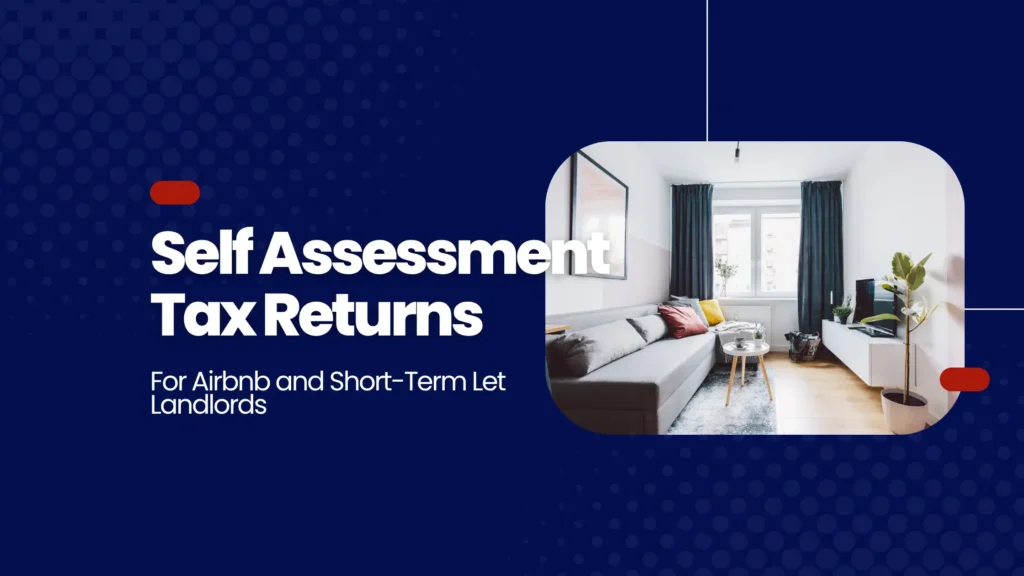Airbnb and short-term letting have become increasingly popular in the UK, especially as more people look to earn extra income from their properties. With this growth, understanding tax obligations has never been more crucial. In 2025, tax reporting is even more important due to new rules around platform data sharing and Making Tax Digital (MTD).
This guide is for Airbnb hosts, short-let landlords, and holiday let owners looking to understand the ins and outs of Self Assessment tax returns.
Do Airbnb and Short-Term Let Hosts Need to File a Self Assessment Tax Return?
If you’re earning from Airbnb or short-term lets, you might need to file a Self Assessment tax return. Here are a few important thresholds to watch out for:
- Over £1,000 in rental income: You must register for Self Assessment if your rental income exceeds £1,000.
- Over £7,500 in rental income: If you’re renting a room in your main home, the Rent-a-Room scheme could apply, which lets you earn up to £7,500 tax-free.
- Platform reporting: HMRC now directly receives income data from platforms like Airbnb, so they’re already aware of your earnings.
Even if you’re only renting out a room or property for a few weeks a year, HMRC might already have your income information. It’s always best to declare it, just to be on the safe side!
How to Fill Out the Self Assessment Tax Return (SA100 + SA105)
Here’s a quick step-by-step guide to completing your Self Assessment tax return for Airbnb or short-let income:
1. Register for Self Assessment:
If you haven’t registered before, you’ll need to do it online with HMRC. Be sure to register by 5 October following the end of the tax year when you first start earning rental income.
2. Filling Out SA105:
The SA105 is the supplementary form specifically for rental income. This is where you’ll input your rental earnings and allowable expenses. Make sure to include details of your income from Airbnb or any short-term lets and any related costs such as repairs, or insurance.
Here’s how a typical income and expense breakdown might look:
- Income: Total rental income from short lets
- Expenses: Things like property management fees, maintenance costs, insurance, and any other eligible costs.
To make it easier, you can download a “SA105 form” from the HMRC website or view visual screenshots to guide you through the process of filling out the form.
Chat with our accountant today
What’s Changing in 2025? (FHL Abolition & MTD Readiness)
Several changes in 2025 will affect Airbnb hosts:
1. FHL Regime Ending: If your property was previously classified as a Furnished Holiday Let (FHL), starting from 6 April 2025, you’ll need to file under standard rental income rules. This means you’ll lose the special tax treatments that applied to FHLs, such as full mortgage interest relief and capital allowances. You’ll now follow the same rules as other landlords renting out property, with less favourable tax treatment.
However, new purchases won’t qualify for capital allowances after April 2025, but you can still claim writing-down allowances on assets you’ve already claimed for.
2. Making Tax Digital (MTD): Starting in 2026, certain landlords will need to comply with MTD for Income Tax Self Assessment (ITSA). This requires:
- Digital record-keeping: Keeping records of income and expenses in a digital format.
- Quarterly filings: Submitting income and expense updates to HMRC every quarter, rather than just once a year.
- End-of-year declaration: Instead of filing a traditional annual Self Assessment return, you’ll submit a final declaration at the end of the tax year.
These changes are designed to modernise the tax system and increase transparency. If you’re impacted by MTD, it’s a good idea to start preparing early and ensure your records are compliant.
What Can I Count as Allowable Expenses for Airbnb Hosts?
There are limits on how much you can claim for mortgage interest, so be mindful of these restrictions.
Capital costs, such as major renovations or improvements, generally can’t be deducted. However, repairs made to maintain the property in a rentable state are allowable.
Claimable vs Non-Claimable Airbnb Host Costs:
| Claimable Costs | Non-Claimable Costs |
|---|---|
| Cleaning & repairs | Private expenses |
| Insurance & agent fees | Improvements (capital costs) |
| Council tax & utilities | Fines or penalties |
HMRC Penalties and Audit Triggers for Airbnb Hosts
HMRC will be closely monitoring rental income. To avoid penalties, ensure you register on time and file your return by the deadline. Discrepancies between your reported income and your actual earnings can trigger an audit. Some common red flags to avoid include claiming disallowed expenses and underreporting rental income. It’s crucial to be transparent and accurate when filing your tax return to prevent any issues with HMRC.
Special Considerations for Non-Resident Airbnb Hosts
Non-resident landlords must consider the Non-Resident Landlord Scheme (NRLS), which ensures tax is deducted from rental income before being paid out.
- If you’re not a UK resident, you’ll still need to file a UK tax return.
- You may be eligible for tax relief or exemption under a double taxation treaty, depending on your country of residence.
Airbnb hosts face significant tax reporting responsibilities in 2025, with the introduction of new rules and platforms reporting directly to HMRC. Now’s the time to get organised and file your taxes correctly. If you’re unsure, book a free consultation with our expert accountant today.

